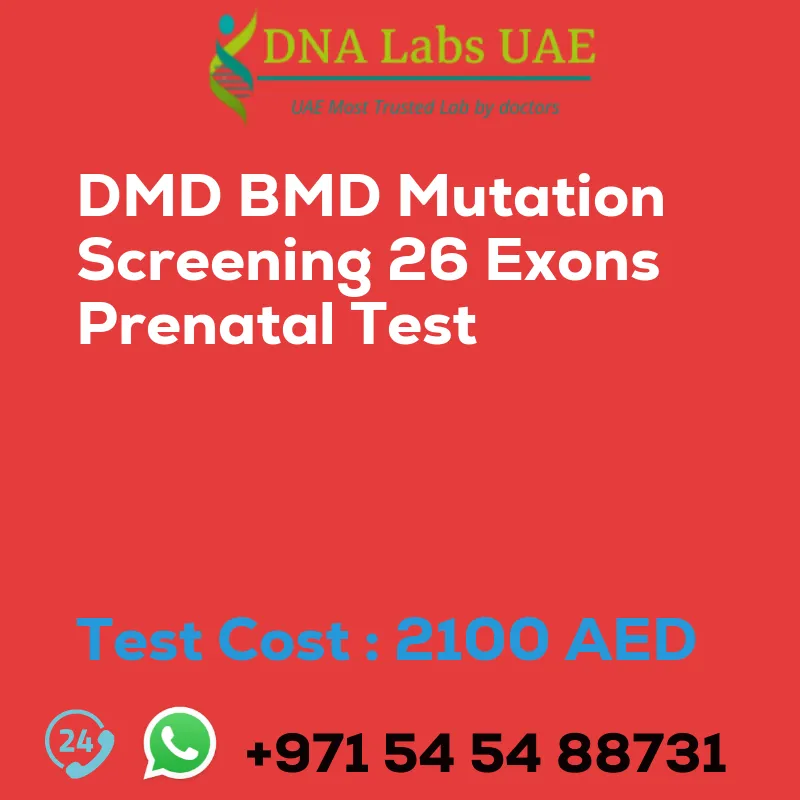DMDBMD Mutation Screening 26 Exons Prenatal Test
At DNA Labs UAE, we offer the DMDBMD mutation screening 26 exons prenatal test. This test helps in analyzing the 26 exons of the DMD (Duchenne muscular dystrophy) or BMD (Becker muscular dystrophy) genes. These two types of muscular dystrophy are caused by mutations in the DMD gene, which codes for a protein called dystrophin.
Test Details
The DMDBMD mutation screening 26 exons prenatal test involves obtaining a sample of fetal DNA, usually through chorionic villus sampling (CVS) or amniocentesis. The DNA is then analyzed to identify any mutations in the DMD gene. This screening test can detect a wide range of mutations, including small deletions, duplications, insertions, and point mutations.
The purpose of this test is to determine if the fetus has inherited a mutation in the DMD gene. If a mutation is detected, it indicates an increased risk of the fetus developing Duchenne or Becker muscular dystrophy. However, it is important to note that the presence of a mutation does not guarantee that the fetus will develop the condition, as the severity of the disease can vary.
This screening test is typically offered to couples who have a family history of Duchenne or Becker muscular dystrophy, or if there is a known carrier in either parent. It can provide valuable information for parents, allowing them to make informed decisions about their pregnancy and to prepare for the possibility of having a child with muscular dystrophy.
Test Components
- Sterile container
- Sterile Normal Saline Container
- EDTA Vacutainer (2ml)
Price
AED 2100.0
Sample Condition
Amniotic fluid / Chorionic villi / Cord blood
Report Delivery
4-5 days
Method
Multiplex End Point PCR
Test Type
Genetics
Doctor
General Physician
Test Department
Pre Test Information
DMD/BMD mutation screening (26 exons) Prenatal can be done with a doctor’s prescription. Prescription is not applicable for surgery and pregnancy cases or people planning to travel abroad.
Consult a Healthcare Professional
It is important to consult with a healthcare professional or genetic counselor to understand the specific implications and limitations of DMD/BMD mutation screening, as well as to discuss any concerns or questions regarding the test.
| Test Name | DMDBMD mutation screening 26 exons Prenatal Test |
|---|---|
| Components | Sterile container / Sterile Normal Saline Container / EDTA Vacutainer (2ml) |
| Price | 2100.0 AED |
| Sample Condition | Amniotic fluid\/ Chorionic villi\/ Cord blood |
| Report Delivery | 4-5 days |
| Method | Multiplex End Point PCR |
| Test type | Genetics |
| Doctor | General Physician |
| Test Department: | |
| Pre Test Information | DMD/BMD mutation screening (26 exons) Prenatal] can be done with a Doctors prescription. Prescription is not applicable for surgery and pregnancy cases or people planing to travel abroad. |
| Test Details |
DMD/BMD mutation screening is a prenatal test that involves analyzing the 26 exons of the DMD (Duchenne muscular dystrophy) or BMD (Becker muscular dystrophy) genes. These two types of muscular dystrophy are caused by mutations in the DMD gene, which codes for a protein called dystrophin. During the test, a sample of fetal DNA is obtained, usually through chorionic villus sampling (CVS) or amniocentesis. The DNA is then analyzed to identify any mutations in the DMD gene. This screening test can detect a wide range of mutations, including small deletions, duplications, insertions, and point mutations. The purpose of DMD/BMD mutation screening is to determine if the fetus has inherited a mutation in the DMD gene. If a mutation is detected, it indicates an increased risk of the fetus developing Duchenne or Becker muscular dystrophy. However, it is important to note that the presence of a mutation does not guarantee that the fetus will develop the condition, as the severity of the disease can vary. This screening test is typically offered to couples who have a family history of Duchenne or Becker muscular dystrophy, or if there is a known carrier in either parent. It can provide valuable information for parents, allowing them to make informed decisions about their pregnancy and to prepare for the possibility of having a child with muscular dystrophy. It is important to consult with a healthcare professional or genetic counselor to understand the specific implications and limitations of DMD/BMD mutation screening, as well as to discuss any concerns or questions regarding the test. |








